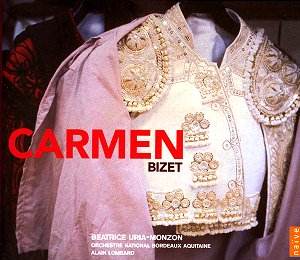A fairly substantial
booklet gives us, in English and French,
an introduction, synopsis and full libretto
of Carmen. In view of the fact that
the recording evidently aims to promote
the work of the Grand-Théâtre
de Bordeaux (several important local
firms helped fund the enterprise) it
would have been nice to have some information
about the production on which the recording
was based, and about those involved.
Obviously the conductor is no stranger
to record-buyers but I must confess
that, of the singers, the only name
not new to me was that of Franck Leguérinel,
of whom I once reviewed a promising
recital disc (made in 1992) and who
sings here (very well) the small role
of le Dancaïre. However, in the
case of Leontina Vaduva, Romanian-born
though long based in France, perhaps
I should be ashamed of my ignorance
since I find she has made a much-praised
recital disc for EMI, issued in 1999,
conducted by Placido Domingo.
It would be a pleasure
to be able to say that this virtually
all-French Carmen shows that the French
tradition, swallowed up by internationalism
in Paris, is alive and well in the provinces,
but it doesnít really. Alain Lombardís
approach to the score is more classical
than particularly French, almost Mozartian
in its clarity and balance. This does
not preclude vitality Ė the opening
of Act IV has considerable fizz Ė but
the prevalence of gentle, pastoral orchestral
colours means that the music increasingly
seems to have little to do with the
passionate drama which is unfolding.
I have heard Carmen conducted in a number
of ways but I donít remember any interpretation
that made me think this.
Rather than an interpretation
in the French tradition, Christian Papis
seems to want to give us a full-throated
Don José in the Franco Corelli
mould. If only he had the voice! Some
of his high notes are clear and ringing
but many are strained and there is little
attempt at characterisation. I have
no idea of Vincent le Texierís age but
he sounds frail, wavery and hoarse.
There are some roles in which diminishing
vocal equipment may be turned to artistic
use but Escamillo is surely not one
of them. A toreador too doddery to take
on his top notes, let alone an averagely
healthy bull, would hardly offer much
in the way of attraction to a sharp
customer like Carmen. His exchanges
with Leguérinelís firmly focused
baritone are embarrassing and I wish
the casting had been reversed.
Fairness compels me
to point out that I made an Internet
search after writing the above and find
that since making these records le Texier
has been praised in France and Germany
for his performances of Wozzeck (1997),
Scarpia (1999) and Golaud (2000/2001).
A French critic, writing of this last,
spoke of his "voix superbe et claire".
Iím afraid I just canít begin to square
this with what I hear on the present
recording.
Vaduva is rich-toned
if sometimes squally as Micaëla
Ė a rather heavier voice than is usually
used and perhaps insufficiently differentiated
from Carmen. Béatrice Uria-Monzon
has a website, designed by her painter
father, which is worth a visit for its
own sake. Carmen has remained one of
her particular specialities and I am
prepared to believe it has by now developed
into quite a performance. She has a
rich mezzo timbre with a fairly wide
but controlled vibrato on the higher
notes. She is notably effective in her
speaking lines and I suggest that, given
space, she could have provided a more
effectively sultry Carmen than the conductor
was prepared to allow.
All in all, no challenge
to the established versions.
Christopher Howell
